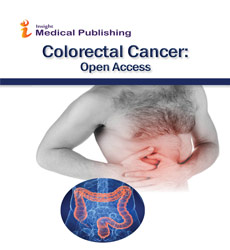Colorectal cancer risk Factors, Treatment and Food habits
Nicole M. Saur*
Department of Colorectal Surgery, University of Pennsylvania, Pennsylvania Hospital, Penn Medicine, Philadelphia, USA
- *Corresponding Author:
- Nicole M. Saur, Department of Colorectal Surgery, University of Pennsylvania, Pennsylvania Hospital, Penn Medicine, Philadelphia, USA, E-mail: SaurNM2013@163.com
Received date: November 06, 2020; Accepted date: November 20, 2020; Published date: November 27, 2020.
Citation: Nicole M S (2020) Colorectal cancer risk Factors, Treatment and Food habits. Colorec Cancer Vol.6 No.3:3
Copyright: © 2020 Nicole M S. This is an open-access article distributed under the terms of the Creative Commons Attribution License, which permits unrestricted use, distribution and reproduction in any medium, provided the original author and source are credited.
Risk factors
A risk factor is anything that raises your chance of getting a disease like cancer. Different cancers have different risk factors. Some risk factors, like smoking, can be changed. Others, sort of a person’s age or case history , can’t be changed.
Colorectal cancer risk factors you can change:
any lifestyle-related factors are linked to colorectal cancer. In fact, the links between diet, weight, and exercise and colorectal cancer risk are a number of the strongest for any sort of cancer.
1. Being overweight or obese
2. Not being physically active
3. Certain types of diets
4. Smoking
5. Alcohol use
Colorectal cancer risk factors you cannot change:
1. Being older
2. A personal history of colorectal polyps or colorectal cancer
3. A personal history of inflammatory bowel disease
4. A family history of colorectal cancer or adenomatous polyps
5. Having an inherited syndrome
6. Lynch syndrome (hereditary non-polyposis colon cancer or HNPCC)
7. Familial adenomatous polyposis (FAP).
Colorectal Cancer: Types of Treatment:
In order to tailor the treatment to every patient, all treatment decisions should consider such factors as:
8. The patient’s other medical conditions
9. The patient’s overall health
10. Potential side effects of the treatment plan
11. Other medications that the patient already takes
12. The patient’s nutritional status and social support
Different types of treatments are:
1. Surgery.
2. Radiation therapy.
3. Chemotherapy.
4. Targeted therapy.
5. Immunotherapy.
Treatment options by stage:
Stage 0 colorectal cancer
The usual treatment may be a polypectomy, or removal of a polyp, during a colonoscopy. There is no additional surgery unless the polyp can't be fully removed.
Stage I colorectal cancer
Surgical removal of the tumor and lymph nodes is typically the sole treatment needed.
Stage II colorectal cancer
Surgery is often the first treatment. People with stage II colorectal cancer should talk with their doctor about whether more treatment is required after surgery because some people receive adjuvant chemotherapy. Adjuvant chemotherapy is treatment after surgery with the goal of trying to destroy any remaining cancer cells. However, cure rates for surgery alone are quite good, and there are few benefits of additional treatment for people with this stage of colorectal cancer. Learn more about adjuvant therapy for stage II colorectal cancer. A clinical test is additionally an option after surgery.
For stage II rectal cancer, radiotherapy is typically given together with chemotherapy, either before or after surgery. Additional chemotherapy could also be given after surgery also .
Stage III colorectal cancer
Treatment usually involves surgical removal of the tumor followed by adjuvant chemotherapy. A clinical trial may also an option. For rectal cancer, radiotherapy could also be used with chemotherapy before or after surgery, along side adjuvant chemotherapy.
Metastatic (stage IV) colorectal cancer
If cancer spreads to a different part within the body from where it started, doctors call it metastatic cancer. Colorectal cancer can spread to distant organs, like the liver, lungs, the tissue called the peritoneum that lines the abdomen, or a woman’s ovaries. If this happens, it's an honest idea to speak with doctors who have experience treating this stage of cancer. Doctors can have different opinions about the simplest standard treatment plan. Clinical trials might also be an option. Learn more about getting a second opinion before starting treatment, so you're comfortable together with your chosen treatment plan.
What foods help fight colon cancer?
1. Choose protein-rich foods.
2. Lean meats such as chicken, fish, or turkey.
3. Eggs.
4. Low fat dairy products such as milk, yogurt, and cheese or dairy substitutes.
5. Nuts and nut butters.
6. Beans.
7. Soy foods.
Open Access Journals
- Aquaculture & Veterinary Science
- Chemistry & Chemical Sciences
- Clinical Sciences
- Engineering
- General Science
- Genetics & Molecular Biology
- Health Care & Nursing
- Immunology & Microbiology
- Materials Science
- Mathematics & Physics
- Medical Sciences
- Neurology & Psychiatry
- Oncology & Cancer Science
- Pharmaceutical Sciences
